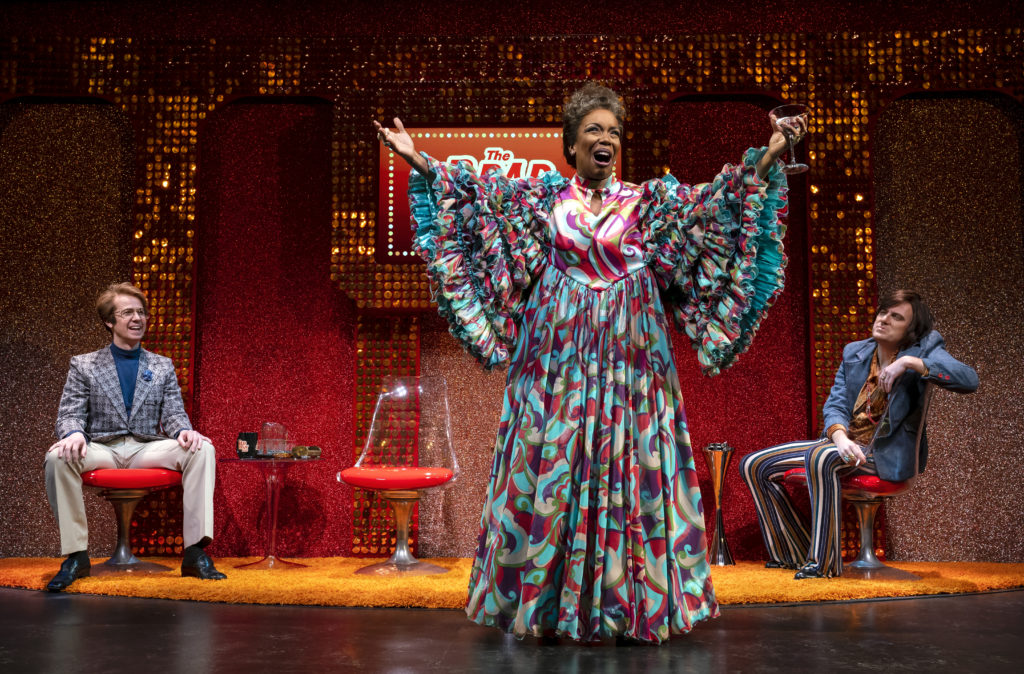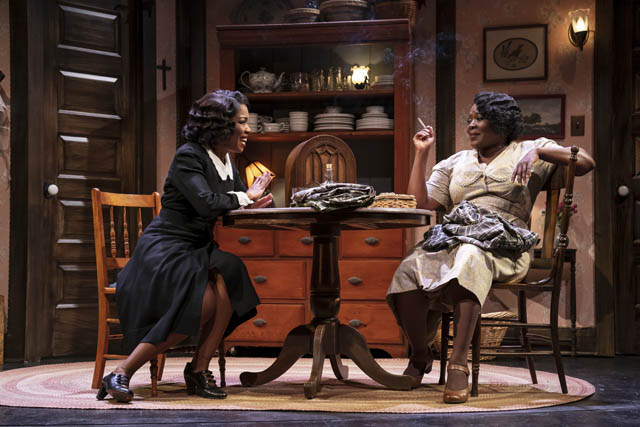Jessica Frances Dukes takes on the titular role in the revival “By the Way, Meet Vera Stark,” an aspiring actress working for a fading star during the Golden Age of Hollywood. Written by Pulitzer Prize winner Lynn Nottage and directed by Kamilah Forbes, the play is a thoughtful tribute to the black actresses of a bygone era, women like Hattie McDaniel and Theresa Harris.
Dukes won an Obie Award for “Bootycandy” and has also appeared in “Is God Is” and “Intimate Apparel,” among other stage productions. Her screen credits include “New Amsterdam,” “NCIS: New Orleans,” and “The Good Wife.”
We talked to Dukes about what “Vera Stark” means to her, the parallels she has found between the character and her own life, and what it’s like to be on the New York stage in 2019 during what Nottage tells her is “a moment.”
“By the Way, Meet Vera Stark” is playing at the Signature Theatre through March 10.
This interview has been edited and condensed.
W&H: What’s it like to be a woman in theater today, particularly in a theatrical season featuring more writers of color and women than perhaps ever before?
JFD: It really is a dream come true, to be in the middle of this story itself, in this season, where I am surrounded by women I have looked up to for a long time. I came to New York about four years ago, and these women were on my dream list back then because they were the movers and shakers in the industry. To be in a theater with all these female directors, playwrights, AD’s, designers, producers now, it’s just a joy to be a part of.
W&H: It sounds like the majority of the crew on “By the Way, Meet Vera Stark” is female.
JFD: Yes, even the producer of the film you see at the top of Act II is female, and she’s also a woman of color.
W&H: What is your collaboration like with Lynn Nottage?
JFD: Lynn is a genius. She’s just so smart and so clear, and I’ve loved her writing since day one. To be in the middle of this process, especially while she’s re-examining these plays [Nottage is the Signature’s Residency One Playwright during the 2018-19 Season] and she was in the room a lot at run-throughs. It was a joy to have a chance to pick her brain — about this play or any her other plays — just to be around her and hear her thoughts on why she wanted to write this particular play, or why she writes in general. She’s an inspiration during this time of change. Lynn was talking the other day about how this is a moment, and we need to figure out how to sustain it.
W&H: Did you feel the same way in that the Oscars were a moment this year?
JFD: I was just so excited and happy. The majority of winners were people of color and it was a joy to see and I hope it’s a normal thing from here on out. I don’t know if it was a movement or actual change, and it will be interesting to see how it fuels my own career. I think it will help me walk a little taller in my auditions. To see people like Regina King, who I’ve been in love with since “227” [the ’80s sitcom King starred in]. A lot of us model our careers after her when it comes to longevity and art. I was so happy to see that award in her hand and to see the look on her face when she got it. She said it best, “I did my best and my best was enough.”
W&H: “By the Way, Meet Vera Stark” examines the legacy and hardships of African American women in film through the career of the fictional Vera Stark, as she goes from a maid in the 1930s to groundbreaking screen icon to obscurity and folklore 40 years later. What did you know about this period of history before joining the cast?
JFD: Surprisingly, a lot of my shows have been based in the 1930s, 1940s, and 1950s, which is great because it has allowed me to know a lot of this history. I rarely work in the present time period. But as far as the history of the industry, I was hip to so many things. I knew nothing about the Hays Code [an informal name for The Motion Picture Production Code] so it was important to learn about that and see what that meant and to study the movies from that time. It helped me look at those actresses 10 to 50 times differently than I did before this play. I knew nothing about Theresa Harris. I knew about Nina Mae McKinney, but to study Harris and her ride and what was taken from her meant a lot. It fueled my Vera and the way I play her, especially in Act II. It fueled her own frustration, anger, and resentment towards the industry.
I’m thankful that I’m now in this industry with that in mind. It gives me more of a purpose of a black artist today to know that I’m standing on something that was built for people who would have been stars today. Not that I didn’t know that before, but I truly know the ins and outs now after studying and reading their biographies and watching their films and interviews once they were older.
W&H: What other kinds of research did you do to get inside Vera’s head and did you learn about any particular actresses from this time period that you didn’t know about before?
JFD: We watched an interview with Butterfly McQueen talking about her experience with “Gone with the Wind” and it broke my heart to watch her grapple with the decision she made to protect herself and how it hindered her working more in the industry. She was labeled difficult because she didn’t want to do certain things. Today we can call our union and go, “hey, look, this is what’s going on,” and see an article in the newspaper the next day.
W&H: After seeing this play, you can really feel how things have changed since then, for both women and people of color.
JFD: Maybe Lynn wrote it for that reason. I mean, she wrote it for many people. As a black actress today, hustling and pounding the pavement and working my way through this industry, and by playing Vera, I’m living out her dream. A room full of people stands up for her every night. I hope that all of those Vera’s from the 1930s see us because my performance is geared toward them, and when these people stand, they’re standing for these women. I’m just so thankful to be able to live out their dream. It makes me work harder during the day when I am working on my pilot season auditions or scheduling meetings. I’m making sure my work gets done, and this work has made me a better person and harder working actor. It’s made me more appreciative of what I have.
W&H: Let’s talk about playing Vera. What’s it like transitioning the character from Act I to Act II? [There is a 40-year gap in which her character ages significantly.]
JFD: In the rehearsal process, I found that [Act II] character first. I look at Vera as a series of different persons. Act II is a different version of her. Because of all the different versions that we meet in Act I, depending on who she’s with or what room she’s in, I wanted to play her with the idea of all of those things at once.
Vera is battling a lot internally, including the struggle of what she was and could have been. To think about all of my own sacrifices in the industry and my heartbreak, or that moment when you were disappointed or treated badly, thinking about that heightened, I can’t imagine the hurt that it was for her. In Act I [as a young maid to a Hollywood star, before she has her break as an actress], she’s in love. She’s in love with the industry. She’s committed to this industry, but unfortunately, she was in love with an abusive partner because the industry didn’t treat her well or value her or give her the things she gave it. What does that abuse look like 40 years later is what I wanted to play with, especially when alcoholism, drugs, or lack of care for yourself come in. The first thing I found was her voice, what it sounds like after years of drinking and smoking and performing in not so nice conditions. What does that mean to your voice and body and light? I hope that answers your question.
W&H: There are so many layers to this play. Are there any parallels for you in where you are in your career?
JFD: It’s my secret sauce every night and my joy as I’m still relatively new to New York City. I’ve only done three shows since being in New York, and I’ve been on TV. I’m working my way up through the industry. But every night I stand on that stage, and I think to myself, “I’ve been here five years!” To be on the Signature stage playing the title role in a Lynn Nottage play, I feel when I got that call [and got the role] I knew exactly like Vera felt when she got that call. I’m in the middle of “The Belle of New Orleans” [Vera’s film role which is featured in Act II] in a sense. “By the Way, Meet Vera Stark” is my dream breakout role.
W&H: What’s next for you? Do you want to continue to look for roles with as much substance as Vera Stark?
JFD: I love the layers. I love playing people that are complex, especially black people who are complex and not seen on the surface. I love to dive into worlds that challenge the way we look at the way we live and take care of ourselves and each other. I love doing things that challenge the masses. I pick roles when I’m blessed enough to be able to pick them, ones that take me a minute to get to because I have to dissect them.








